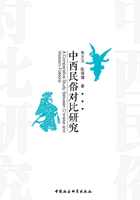
2. Classifications of Folklore
Folklore is a complexity, ranging from society-based economic activities and corresponding relations to the various systems and ideologies of the superstructure, all of which involve certain folk phenomena and related mental activity. Therefore, it is generally divided into the following four categories:
(1)Material Folklore
It refers to the repetitive and stereotyped activities that people conduct in the process of creating and consuming material wealth, which basically concerns aspects such as production, trade, food, costumes, residence, transportation and health etc.
(2)Social Folklore
Social folklore, also known as social structural and institutional folklore, is the socialrelated routine formed under certain conditions. It is also a collective behavioral mode that people apply and pass on from generation to generation in daily interaction from the level of individual, family, community, nationality and internationality. The tradition primarily consists of social structural folklore(blood relations, geographical relations and occupational relations), social institutional folklore(customary law, life rituals), festival folklore and entertaining folklore.
(3)Spiritual Folklore
It is the ideological convention formed on the basis of material culture and institutional culture. Being the mental experience that human generated from the process of realizing and transforming nature and society, it becomes spiritual folklore once becoming collective mental habits and given behaviors inherited from ancestors. This type of folklore usually comprises folk beliefs, magic, philosophy, ethics and art etc.
(4)Verbal Folklore
Verbal folklore refers to the information exchange system established through oral convention and collective heritage, which consists of two parts: the folk language and folk literature. Language is a cultural carrier, with every region and nation owning its specific tongue, thus those national languages and dialects are broad folk languages. Correspondingly, narrow folk languages are the recurring formula adopted in certain regions or nations with specific meanings, such as folk sayings, proverbs, riddles, twisters, street buzzwords, cants, drinking games and so on. As to folklore literature, it is the collectively created and popular oral literature, namely myths, folk tales, folk songs and other forms.
Social life is an integrity, accordingly, folklore is systematic as well. Therefore, there exist mutual restricted or beneficial connections among the above mentioned four categories which influence each other and constantly change with the development of the times.